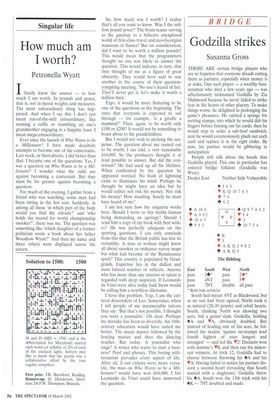Singular life
How much am I worth?
Petronella Wyatt
Ifinally know the answer — to how much I am worth. In pounds and pence, that is, not in moral weights and measures. The most extraordinary thing has happened. And when I say this I don't just mean run-of-the-mill extraordinary, like winning a raffle or stumbling on one's grandmother engaging in a Sapphic feast. I mean mega-extraordinary.
Ever since the launch of Who Wants to be a Millionaire? I have made desultory attempts to become one of the contestants. Last week, or thereabouts, I did better than that: I became one of the questions. Yes, I was a question on Who Wants to be a Millionaire? I wonder what the odds are against becoming a contestant. But they must be far greater against becoming a question.
For much of the evening. I gather from a friend who was watching, some man had been sitting in the hot seat. Suddenly, in among all those 'in which part of the body would you find the clavicle?' and 'who holds the record for world championship snooker?', there was me. The question was something like 'which daughter of a former politician wrote a book about her father Woodrow Wyatt?' And then my name and three others were displayed across the screen.
So, how much was I worth? I realise that's all you want to know. Was I the million pound poser? The brain-teaser serving as the gateway to a hitherto unexplored world of first-class travel and neo-Georgian mansions in Sussex? But on consideration, did I want to be worth a million pounds? This would mean that the programmers thought no one was likely to answer the question. This would indicate, in turn, that they thought of me as a figure of great obscurity. They would have said to one another in the course of their questioncompiling meeting, 'No one's heard of her. They'll never get it, let's make it worth a million then.'
Ergo, it would be more flattering to be one of the questions at the beginning. The ones that everyone is expected to sail through — for example, 'is a giraffe a mammal?' Then, again, to be worth only £100 or £200? It would not be something to boast about to the grandchildren.
But I would not wish to prolong the suspense. The question about me turned out to be worth, I am told, a very reasonable £64,000. So the producers thought it at least possible to answer. But did the contestant? He had used up all his lifelines. When confronted by the question he appeared worried. No flash of lightning came to illuminate his mind. Perhaps he thought he might have an idea but he would rather not risk his money. Not risk his money! How insulting. Surely he must have heard of me?
I am not sure how the etiquette works here. Should I write to this feeble human being demanding an apology? Should I send him a copy of my book with best wishes? He was perfectly adequate on the sporting questions. I can only conclude from this that the British public has lost its versatility. A man or woman might know all about snooker or ordnance survey maps but what had become of the Renaissance spirit? This country is populated by Gradgrinds. Expertise lies in the dullest and most limited number of subjects. Anyone who has more than one interest or talent is regarded with deep suspicion. If Leonardo da Vinci were alive today Jack Straw would be calling him a worthless dilettante.
I have this problem. Yup, I am the cultural descendent of Leo. Sometimes, when I tell people of my innumerable talents they say: 'But that's not possible. I thought you were a journalist.' Oh dear. Perhaps my mistake has been to diversify. An 18thcentury education would have suited me better. The music master followed by the fencing master and then the dancing teacher. But today. A journalist who sings? A writer who wants to start a business? Poof and phooey. This boring utilitarianism pervades every aspect of life. After all, if our culture were more versatile, the man on Who Wants to be a Millionaire? would have won £64,000. I bet Leonardo da Vinci could have answered the question.


































































 Previous page
Previous page